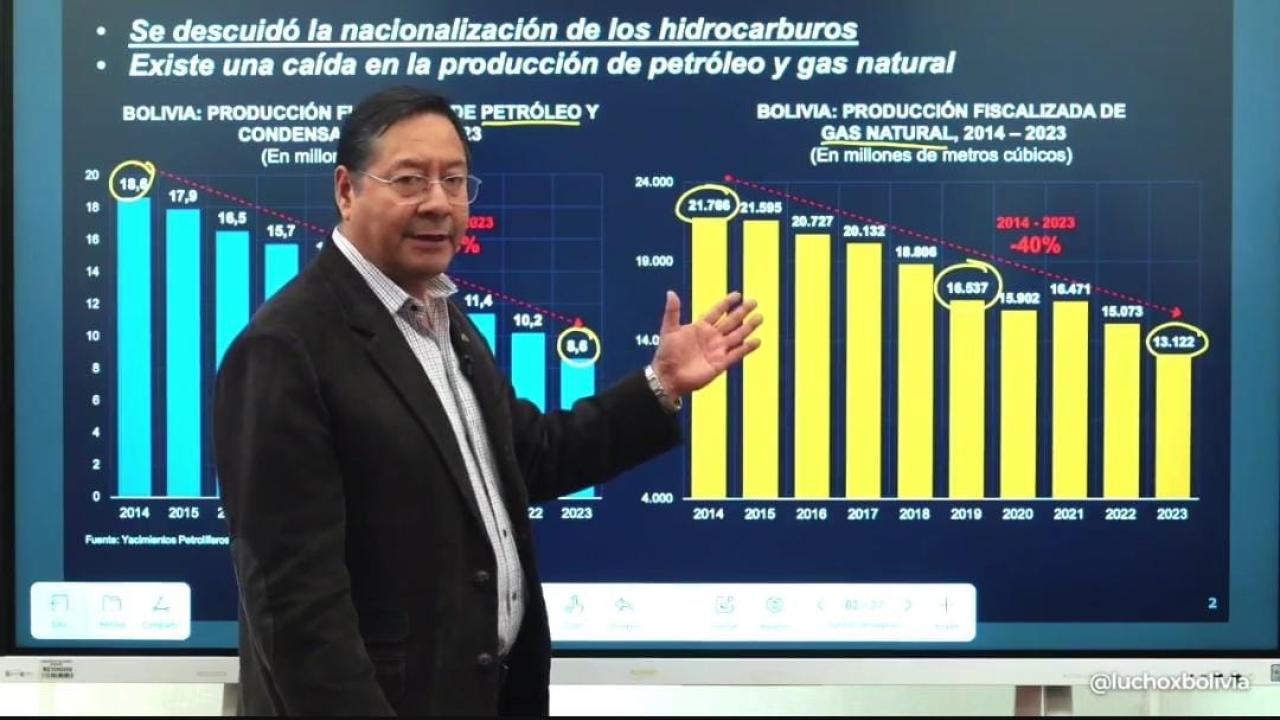
In a lengthy explanation, the Bolivian president said that the 2006 nationalization was not taken care of, which today generates less production and more payments for fuel imports.
Lack of investment in exploration, lack of attention to nationalization and unapproved loans by the Legislative Assembly are the three main causes of the lack of dollars in Bolivia, said Luis Arce, the president of the high plateau country, on Sunday.
In a lengthy explanation, the president justified the lack of foreign currency as a result of a series of problems that are framed, above all, in the lack of investment in exploration by the previous government, which experienced the boom in hydrocarbon production in the country.
In his explanation, he said that Bolivia receives fewer dollars, invests more in the import of diesel and gasoline, at high prices and volumes, and does not receive income from external loans.
"We are experiencing something that was not done seven years ago," he insisted, referring to the period led by former President Evo Morales.
He insisted that during the period of government that corresponded to former President Evo Morales, the nationalization of hydrocarbons on May 1, 2006 was "neglected."
He gave as an example that oil production that year reached 15 million barrels per year; in 2014, during the phase of greatest economic prosperity, 18.6 million barrels, and in 2023, barely 8.6 million barrels.
DOLLARS
He also said that gas production has fallen, as has exports of the product. As a result, he said, the country is receiving less foreign currency than it did years ago.
Bolivia produces only 44% of the gasoline it consumes, 56% of which is imported. As for diesel, it produces only 14%, 86% of which is imported.
He said that there was no investment in gas exploration. In his opinion, this problem led to dependence on diesel and gasoline imports, as well as increased volumes and high prices.
This situation is complicated by the increase in demand for fuel in the country. In 2010, consumption was 5.8 million barrels of gasoline and to date it has risen to 14.5 million barrels of gasoline.
Arce also questioned the Legislative Assembly's "boycott" of the approval of 12 loans, to date, worth US$1.076 billion.
Arce explained that in the past there was a favorable balance because there were more dollars from external credit disbursements compared to the amount paid in interest and capital.
TRADE DEFICIT
While in 2017 Bolivia recorded a credit disbursement of US$ 2,397 million and paid capital and interest of US$ 577 million, in 2023 that situation was reversed, paying US$ 1,047 million and receiving US$ 332 million in disbursements; a negative balance.
He also revealed that the country's private sector has maintained a historic trade deficit since 2023; that is, it spends more on its imports than it generates in exports.
“There is a problem here (private trade deficit), which is why we met with various sectors to increase exports. We are living in a period in which the private sector, as has happened throughout this time, has not generated enough dollars to cover its own imports,” he said.
According to the data presented yesterday by Arce, between 2007 and 2023 the private trade deficit was between minus US$ 794 million and minus US$ 2,349 million, which was largely covered by public sector exports, which, however, declined and now cannot cover this dollar requirement.
Added to these problems is the global crisis, with rising prices for containers, food and oil.









